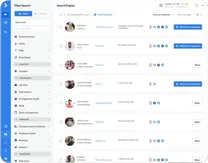
In recent years, there were an estimated 332.99 million SMEs globally, up from 328.5 million in 2019. This increase shows the need for accurate small business leads to stay competitive.
Finding these leads is tough, and many small businesses struggle to reach their target audience. They face issues like limited resources and the complexities of digital marketing. This can slow growth and limit connections with interested customers.
To tackle these problems, we’re discussing 12 ways to find and generate small business leads. These methods range from customer referrals and social media to using tools like Swordfish AI.
Each strategy offers a solution to overcome the challenges of lead generation in a crowded market. Let’s start!
What are Small Business Leads?
Small business leads are potential customers who have shown interest in the products or services offered by small businesses. These leads assist the growth and sustainability of small enterprises, as they represent the first step in converting an interested individual into a paying customer.
Unlike leads for larger corporations, small business leads often require a more personalized approach to conversion. Small businesses typically have closer relationships with their customer base, so they thrive with more direct and personal engagement strategies like usage of ideal customer profiles.
This difference means that for them, high-quality leads might be generated through community involvement, local events, or word-of-mouth recommendations rather than large-scale marketing campaigns.
Additionally, small businesses may focus on local or niche markets, making their leads more specific in terms of interests and needs.
Why is Small Business Leads Database Important?
A small business leads database is important because it organizes potential customer information, making it easier for businesses to target and communicate with prospects. This database supports marketing efforts and helps in converting leads into paying customers.
Let’s look at more reasons –
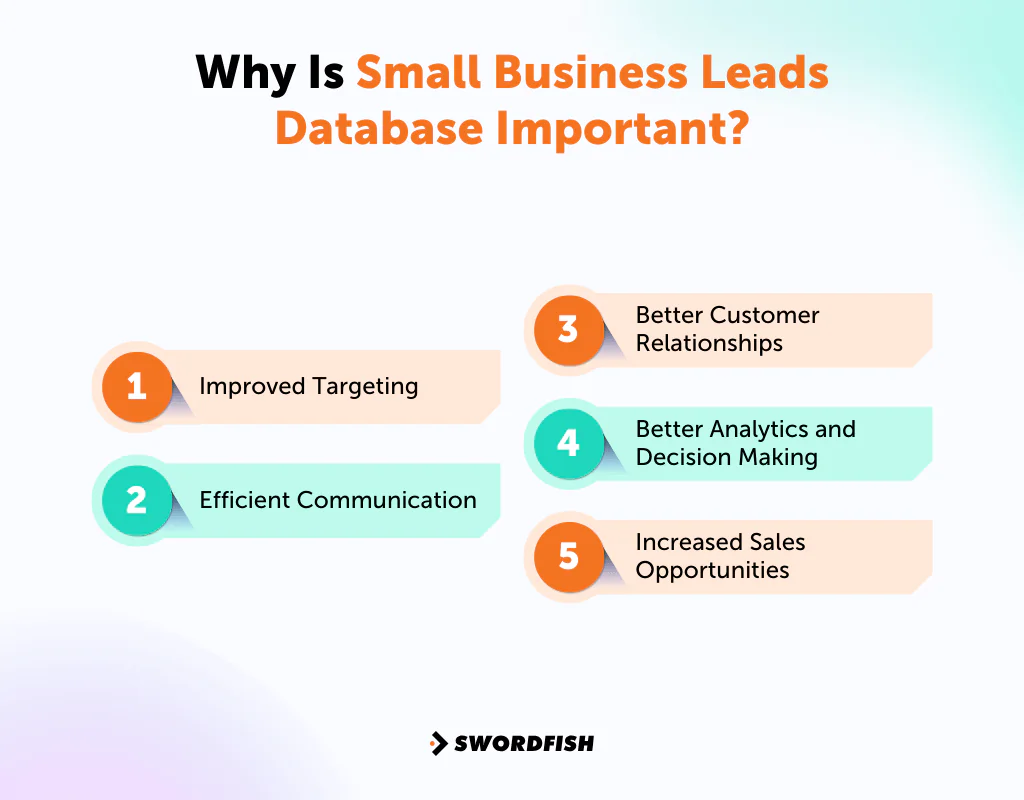
Improved Targeting
Having a leads database allows small businesses to categorize prospects based on various criteria like interests, demographics, or past interactions. This makes it easier to tailor marketing messages that are more likely to resonate with each segment, increasing the chances of conversion of consumer leads .
Efficient Communication
A well-maintained database or email lists also means businesses can quickly access contact information. In turn, there will be timely and effective communication with potential qualified leads. This can include follow-ups, promotional offers, or updates about new products or services.
Better Customer Relationships
By tracking interactions and preferences, businesses can personalize their approach to each qualified lead. Personalization can greatly improve customer satisfaction and loyalty, as prospects feel valued and understood.
Better Analytics and Decision Making
Analyzing the data from the fresh leads database can provide insights into which marketing strategies are working and which are not. This helps businesses make informed decisions about where to allocate resources for the best return on investment.
Increased Sales Opportunities
With detailed information about potential customers, businesses can identify upselling and cross-selling opportunities more effectively as a part of their sales methodology. This can lead to increased sales and revenue among buyer personas without the need for acquiring new customers.
Who Needs Small Business Leads?
Small business leads are essential for entrepreneurs, startup founders, and small business owners looking to grow their customer base, increase sales, and expand their market presence.
These individuals rely on leads to fuel their business’s growth and ensure its sustainability. Let’s have a closer look –
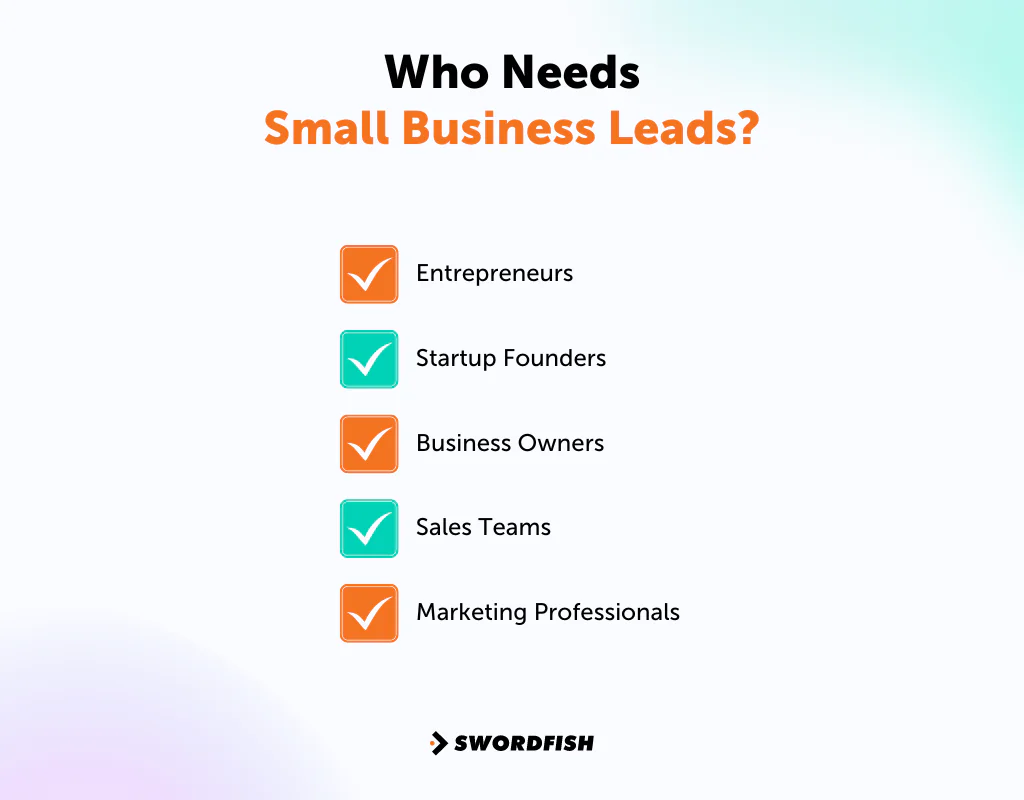
Entrepreneurs
Entrepreneurs starting new ventures need a business leads database to kickstart their sales process and customer engagement. Leads provide the initial customer base that can help validate their business model, refine their product or service offerings, and begin generating revenue.
Startup Founders
Startup founders, particularly those in competitive markets, need leads to quickly establish a foothold and start building their brand, especially small business leads, free of cost.
Leads are even more needed for testing product-market fit, attracting early adopters, and gaining the traction needed to attract further investment.
Business Owners
Owners of established small businesses need sales leads lists to maintain and grow their operations. For them, leads are not just about survival but about expanding their customer base, entering new markets, and increasing profitability in a sustainable way.
Sales Teams
Teams need sales leads databases constantly. Small businesses depend on a steady stream of business lead lists to meet their targets. Leads allow them to engage with potential customers, close deals, and directly contribute to the business’s financial success.
Marketing Professionals
Marketing professionals in small businesses buy leads list to measure the effectiveness of their campaigns. Leads help them understand which marketing strategies are working, allowing them to optimize their efforts for better engagement and conversion rates.
How to Get Small Business Leads: 12 Best Ways
From using social media to making the most of email marketing, here are 12 of the best strategies to generate the best small business leads –
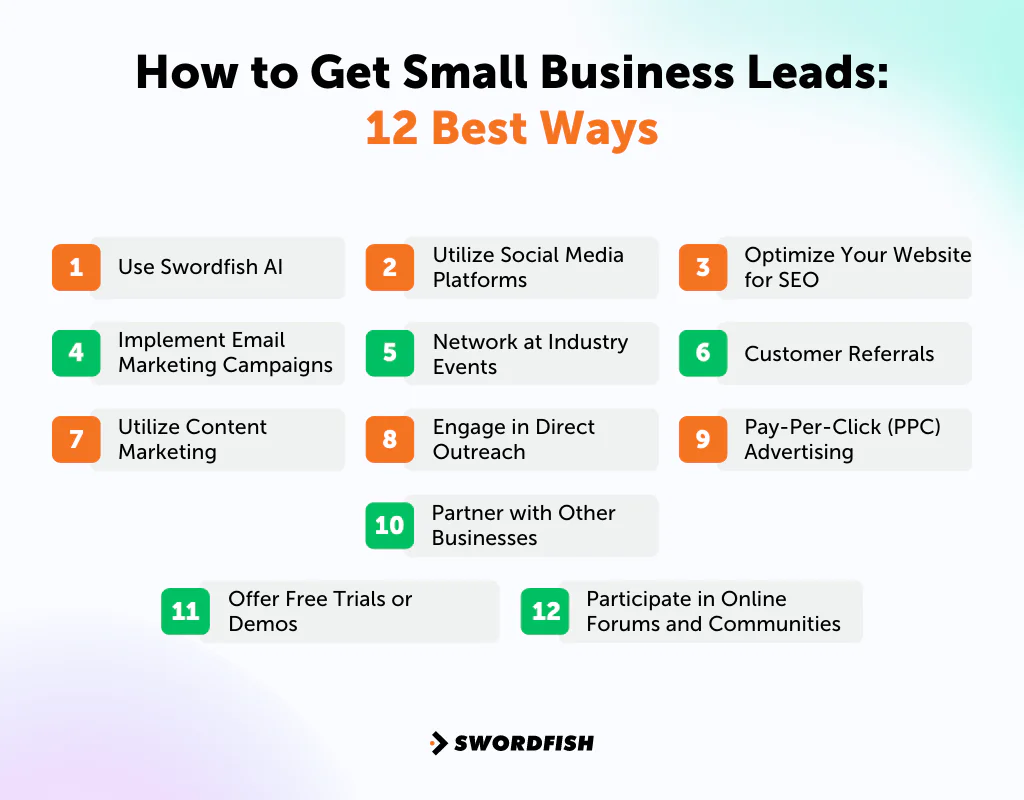
1. Use Swordfish AI: The Best Lead Generation Tool
Swordfish AI is quite an affordable and powerful tool for small businesses looking to generate quality leads. With access to over 3.5 billion data points, the platform makes sure that you can reach a wide range of potential clients.
One of the key features is real-time verification, which guarantees that the information you receive is up-to-date, so the quality of your leads is refined.
The proprietary algorithms are designed to sift through huge amounts of data. This method assures that the leads you get are the most relevant to your business needs.
Plus, this process confirms that the email addresses you use are accurate, minimizing bounce-backs. You have a much better chance of success with your email campaigns.
Moreover, our collaboration with over 200 data partners significantly broadens the scope and diversity of our database. What you are left with is unparalleled access to potential small business leads.
Features of Swordfish AI for Small Business Lead Generation
Swordfish AI offers a suite of features made to help in small business lead generation efforts. Here’s how each feature contributes to acquiring high-quality small business leads –
-
Prospector Tool
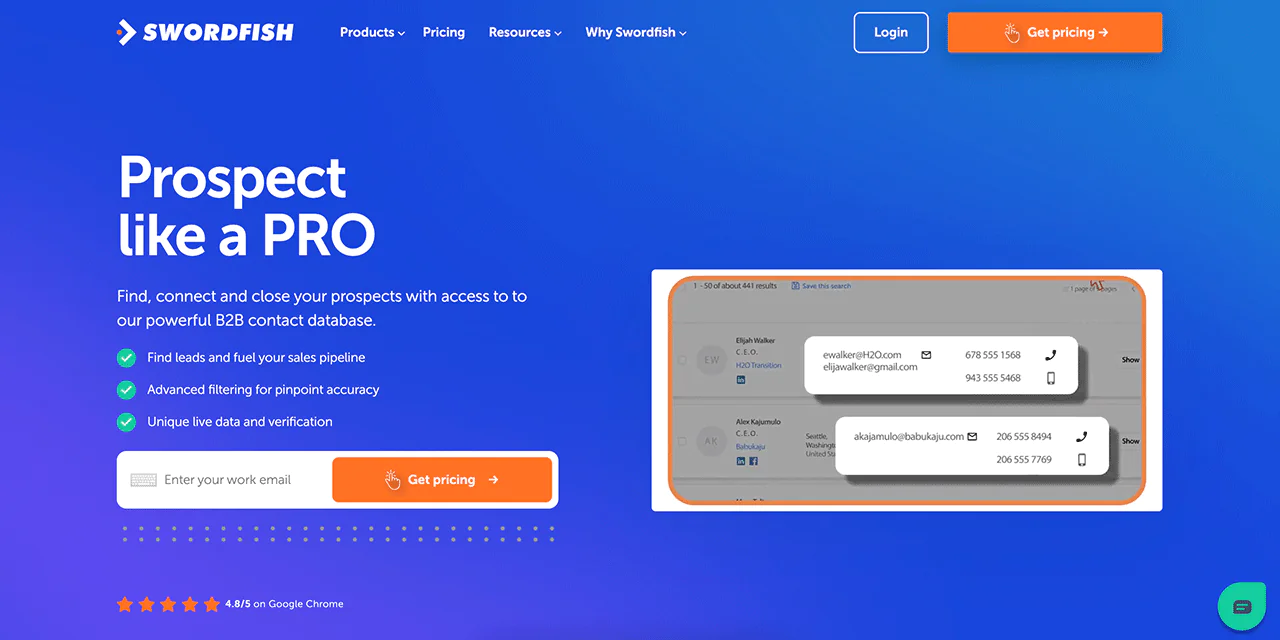
Swordfish AI’s Prospector feature makes it easy to find small business leads by offering targeted search capabilities and real-time data. The tool’s advanced filters refine searches by industry, company size, and location, making lead generation more focused and efficient.
-
Reverse Search
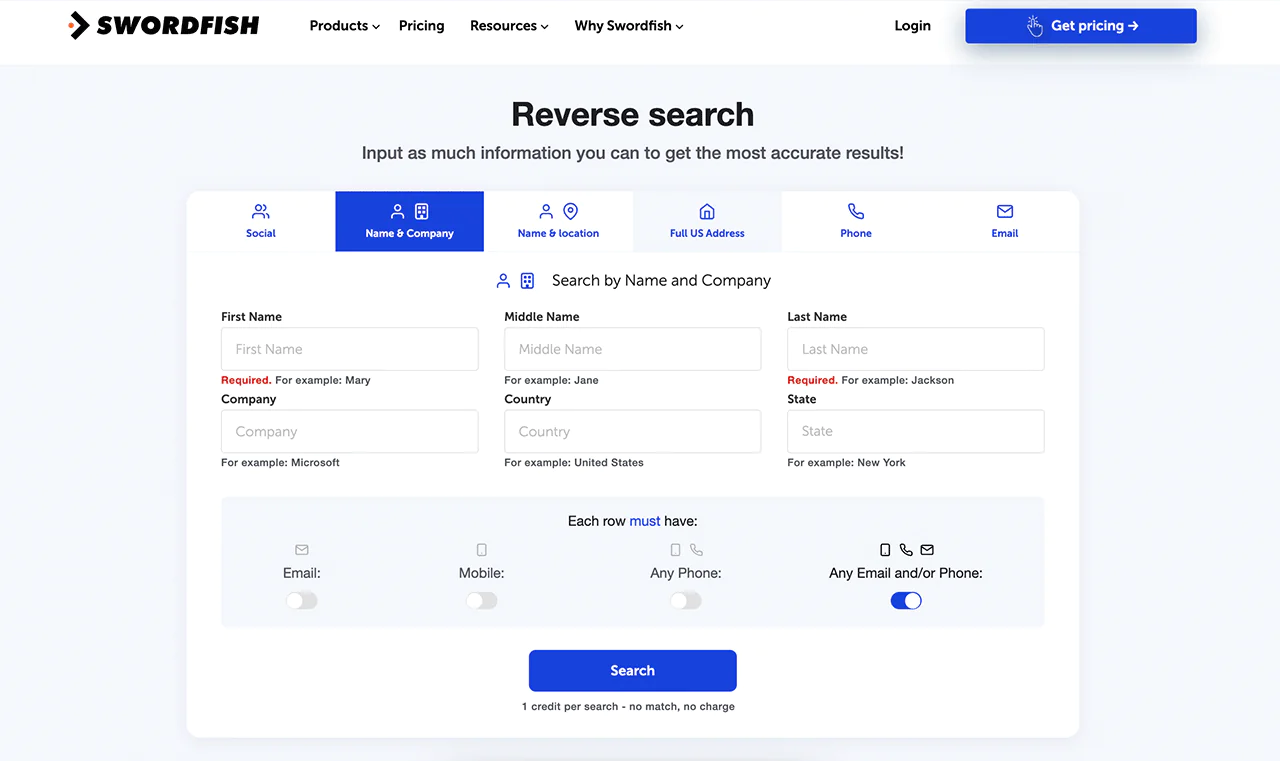
The Reverse Search feature is for finding comprehensive contact details from minimal initial data. This is especially useful for small businesses looking to broaden their outreach within particular sectors or companies, finding new leads from known contacts.
-
API Access
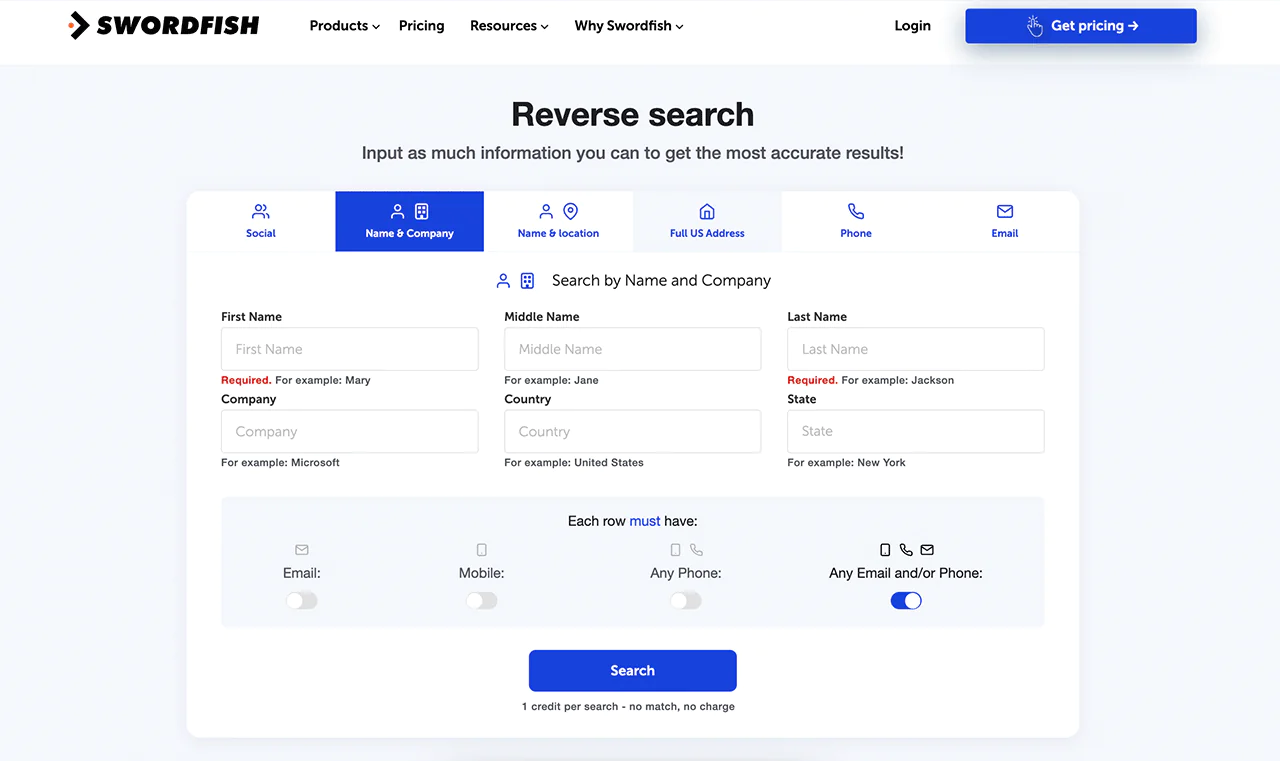
API integration simplifies and automates lead generation by incorporating Swordfish AI’s data directly into sales applications. Your lead generation methods are always based on the most recent and accurate information.
-
Bombora Intent Data
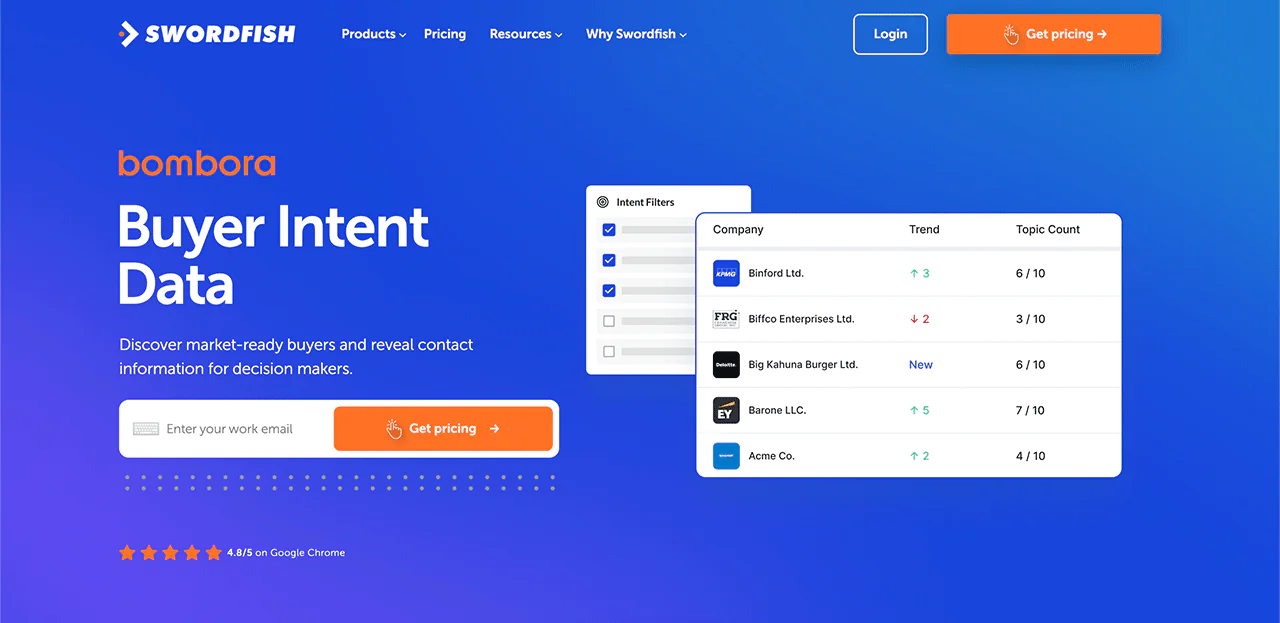
By utilizing Bombora® Intent Data, Swordfish AI helps small businesses to identify companies actively wanting solutions. You can get hold of the best b2b lead list companies out there. This timely insight allows for targeted and personalized outreach so you can connect with leads when they’re most ready to engage.
-
Chrome Extension
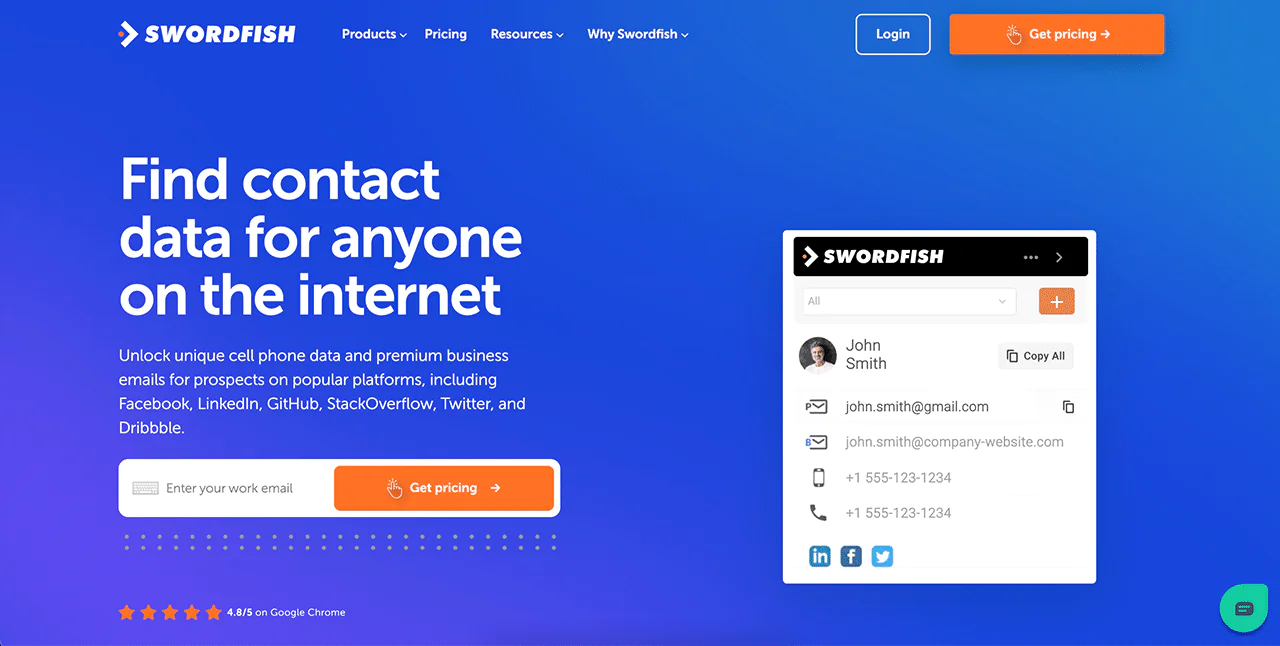
Swordfish AI’s Chrome Extension helps small businesses find potential leads online. It provides access to verified cell phone data and premium business emails. This tool works on individual profiles and lists across platforms like Facebook and LinkedIn.
-
File Upload
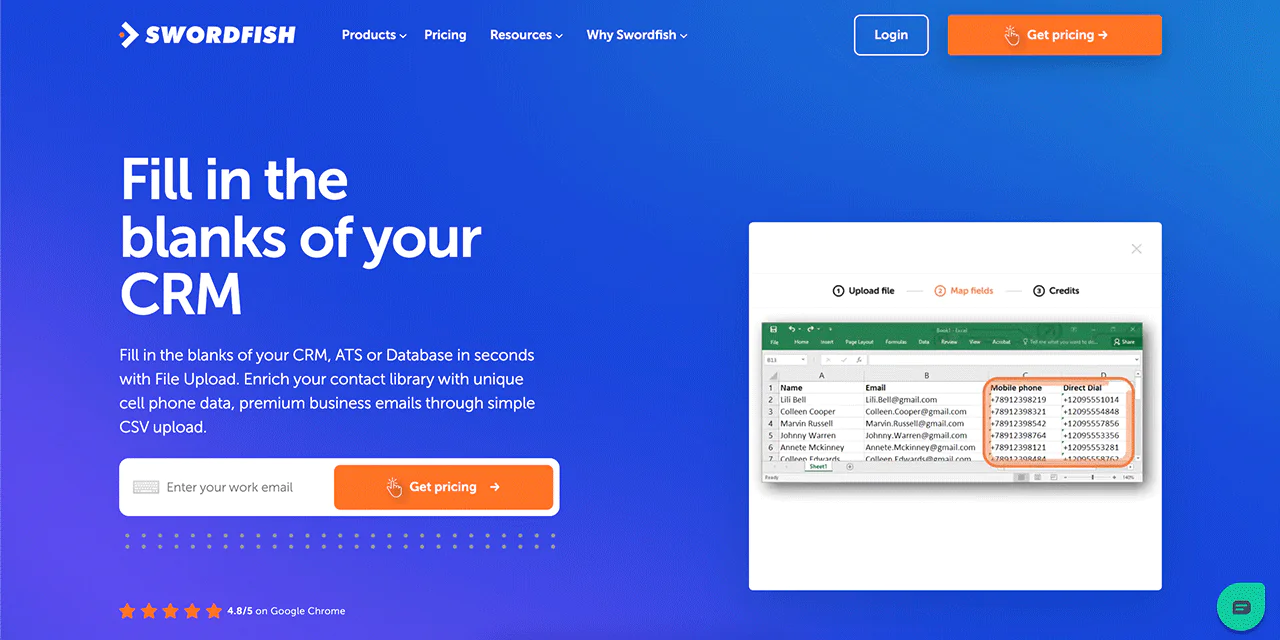
Swordfish AI integrates with CRMs and ATS systems. This file upload feature automatically updates your contact database. It fills in missing information. Small businesses can keep their CRM updated with unique cell phone data and premium business emails. This ensures all lead information is complete and accurate.
-
Email Verifier
Using the Email Verifier feature, enter the email addresses into Swordfish that you need to check. The tool evaluates each email for authenticity, assisting in refining your list by eliminating emails that are invalid or no longer active
2. Utilize Social Media Platforms
To generate small business leads, utilizing social media platforms is a key strategy. By engaging with your audience, running targeted ads, and using influencer marketing, businesses can increase their visibility and attract potential customers.
-
Engage with Your Audience
Interact regularly on social media by posting content, replying to comments, and joining conversations. This builds a community around your brand, attracting new leads through genuine engagement, like a bakery sharing daily specials.
-
Run Targeted Ads
Use social media’s targeted advertising tools to reach specific demographics based on interests and location. For example, an online bookstore can target literature enthusiasts in a particular area to draw in interested leads.
-
Influencer Marketing
Partner with influencers whose followers match your target market. A company selling eco-friendly products might collaborate with sustainability influencers, using their authentic content to attract followers as potential leads.
3. Optimize Your Website for SEO
If you want to get small business leads for startups, a great method is to optimize your website for SEO. This improves online visibility, attracts organic traffic, and generates leads by ranking higher in search engine results.
-
Keyword Research and Implementation
Identify and use keywords relevant to your business in website content and meta descriptions. For instance, a local coffee shop might target phrases like “best espresso in [City Name]” to attract local coffee enthusiasts searching online.
-
Content Marketing
You can create relevant content that addresses your audience’s needs and interests. A home improvement business could blog about DIY tips, showcasing their expertise and drawing in homeowners looking for guidance, thereby generating leads.
-
Local SEO Strategies
A good idea is to optimize your website for local searches by including your business’s location and service area. A pet grooming service can list its services along with specific neighborhoods served, making it easier for local pet owners to find them online.
4. Implement Email Marketing Campaigns
Then again, implementing email marketing campaigns is an effective way for small businesses to reach out directly to potential leads, nurture them with personalized content, and convert them into loyal customers.
-
Newsletter Sign-ups
You can also offer incentives for website visitors to subscribe to your newsletter. This will create a direct channel to nurture leads with updates, offers, and useful information.
-
Personalized Email Content
You may write emails that cater to the specific interests and past interactions of your subscribers. This approach increases engagement by making each communication feel relevant and tailored to the individual.
-
Automated Follow-up Sequences
Set up automated emails to engage subscribers based on their actions, such as welcoming new subscribers or re-engaging those who haven’t interacted with your emails recently, to keep your business top of mind.
5. Network at Industry Events
Networking at industry events is a great strategy for small businesses to build relationships, showcase their products or services, and generate leads by connecting with potential customers and partners in person.
-
Attend Trade Shows and Conferences
You can attend trade shows and conferences relevant to your industry to meet potential customers, learn about competitors, and stay updated on industry trends. This exposure can help you generate leads by showcasing your expertise and solutions.
-
Host or Sponsor Local Events
You can host or sponsor local events to increase your business’s visibility within the community. This approach not only positions you as a key player in your industry but also allows you to directly engage with potential leads in a more personal setting.
-
Utilize Virtual Networking Opportunities
You can make the most of virtual networking opportunities, such as webinars or online industry meetups, to connect with leads who may not be geographically close. This method lets you extend your reach beyond local events and tap into a wider audience interested in your offerings.
6. Customer Referrals
Using customer referrals is a powerful strategy for small businesses to generate leads. Satisfied customers can become advocates for your brand, recommending your products or services to friends and family.
-
Create a Referral Program
You can create a referral program that rewards existing customers for bringing in new leads. Offering discounts or free services as incentives encourages customers to share their positive experiences with others.
-
Incentivize Word-of-Mouth Marketing
You can incentivize word-of-mouth marketing by recognizing and rewarding customers who actively promote your business on social media or through personal recommendations. This can turn loyal customers into brand ambassadors.
-
Showcase Customer Testimonials
You can showcase customer testimonials on your website and social media channels. Highlighting positive reviews and success stories builds trust with potential leads and demonstrates the value of your offerings.
7. Utilize Content Marketing
Utilizing content marketing is an effective approach for small businesses to attract and engage potential leads by providing them with useful and relevant information.
-
Blog Posts and Articles
You can write blog posts and articles that address common questions or concerns in your industry. This not only helps improve your SEO rankings but also establishes your business as a knowledgeable authority in your field.
-
Infographics and Videos
You can create infographics and videos to share complex information in an easy-to-understand and engaging format. Visual content is more likely to be shared, increasing both your reach and potential for generating leads.
-
Ebooks and Whitepapers
You can offer e-books and whitepapers as in-depth resources on specific topics. By requiring users to provide their contact information to access these materials, you can collect leads while providing them with valuable content.
8. Engage in Direct Outreach
Engaging in direct outreach is a targeted method for small businesses to connect with potential leads who may have a specific interest in their products or services.
-
Cold Calling
You can initiate cold calls to potential leads to introduce your business and offer solutions that might interest them. This direct approach allows for immediate feedback and the opportunity to address any questions or concerns.
-
Direct Mail Campaigns
You can send personalized letters or postcards to a targeted list of potential leads. This method stands out in the digital age, as it works as a tangible reminder of your business that recipients can hold onto.
-
LinkedIn Outreach
You can use LinkedIn to connect with potential leads by sending personalized messages or connection requests. You can also do so by finding email addresses on Linkedin. This platform is especially useful for B2B businesses looking to engage with professionals in their industry.
9. Pay-Per-Click (PPC) Advertising
Pay-Per-Click (PPC) advertising is a strategy that allows small businesses to place ads online and pay only when someone clicks on them, offering a direct way to drive traffic and generate leads. It includes –
-
Google Ads
You can use Google Ads to appear in search engine results for specific keywords related to your business. This method helps you reach people actively searching for the products or services you offer, increasing the likelihood of conversion.
-
Social Media Ads
You can create targeted ads on social media platforms to reach a specific audience based on demographics, interests, and behaviors. This personalized approach helps ensure that your message reaches those most likely to be interested in your business.
-
Retargeting Campaigns
You can implement retargeting campaigns to show ads to users who have previously visited your website but did not make a purchase or inquiry. This keeps your brand top of mind and encourages them to return and engage with your business.
10. Partner with Other Businesses
Partnering with other businesses is a collaborative strategy that allows small businesses to expand their reach and generate leads by tapping into each other’s customer bases.
-
Cross-Promotion Opportunities
You can identify businesses that offer complementary products or services and collaborate on cross-promotion efforts. This could involve co-hosting events, bundling services, or sharing each other’s content on social media, effectively doubling your visibility.
-
Joint Venture Partnerships
You can enter into joint venture partnerships where both businesses work together on a specific project or service offering. This partnership allows both parties to use each other’s strengths and resources, reaching a wider audience and generating leads for both businesses.
-
Affiliate Programs
You can set up an affiliate program where other businesses or individuals promote your products or services in exchange for a commission on sales they generate. This incentivizes others to spread the word about your business, leading to increased lead generation. You have to ensure that yours is one of the trusted affiliate programs in the industry so that you can attract more bloggers, influencers, and affiliate marketers..
11. Offer Free Trials or Demos
Offering free trials or demos is a strategy that allows potential customers to experience your product or service before committing to a purchase, increasing the likelihood of generating leads and conversions.
-
Product Demonstrations
You can offer live or virtual product demonstrations to showcase the features and benefits of your product. This hands-on approach helps potential customers understand how your product works and how it can solve their problems, encouraging them to move forward in the sales process.
-
Limited-Time Offers
Implementing limited-time offers on your services or products as part of a free trial can create a sense of urgency among potential leads. This strategy encourages them to try your offering sooner rather than later, increasing the chances of conversion.
-
Free Consultations
Providing free consultations allows you to engage directly with potential leads, understand their needs, and offer personalized solutions. This one-on-one interaction builds trust and demonstrates your commitment to customer satisfaction, making it more likely that they will choose your business.
12. Participate in Online Forums and Communities
Participating in online forums and communities is a method for small businesses to engage with potential leads by contributing valuable insights and advice, thereby building brand awareness and trust.
-
Engage in Relevant Discussions
You can actively participate in discussions on platforms like Reddit, Quora, or industry-specific forums. By answering questions and providing expert advice, you position your business as a helpful and knowledgeable authority, attracting leads interested in your expertise.
-
Share Expertise and Advice
Sharing your expertise and advice in these online communities can help you establish credibility and trust with potential customers. It’s important to focus on genuinely helping others rather than directly promoting your business, which can lead to organic interest in your services or products.
-
Build Brand Awareness
Regular participation in these forums and communities helps build brand awareness. As you become a recognized and respected contributor, members of these communities are more likely to recommend your business to others, effectively generating leads through word-of-mouth.
Conclusion
To conclude, generating small business leads is a must for the growth and sustainability of SMEs or start ups in a competitive market.
Remember, the key to successful lead generation lies in understanding your audience, using the right digital tools, and maintaining consistent engagement. It’s about quality over quantity. You have to focus on strategies that attract genuinely interested prospects.
Among the various strategies discussed, Swordfish AI stands out for the ability to make the process of finding and connecting with potential leads incredibly easy.
By integrating advanced technologies, Swordfish AI can help small businesses efficiently identify and reach their target audience. You’ll find the task of lead generation more manageable and effective.
FAQs
How often should I update my content marketing strategy to generate leads?
It’s advisable to review and update your content marketing strategy at least quarterly. Market trends, customer preferences, and your business goals can change, so regularly updating your strategy ensures your content remains relevant and effective in attracting leads.
Can customer feedback directly impact my lead generation efforts?
Yes, customer feedback can significantly impact your lead generation efforts. Positive feedback and testimonials can enhance your business’s credibility, while addressing negative feedback can improve your offerings. Both actions can attract new leads by demonstrating your commitment to customer satisfaction.
What’s the role of analytics in improving my lead generation strategy?
Analytics play a crucial role in improving your lead generation strategy by providing insights into which tactics are working and which aren’t. By analyzing data on website traffic, conversion rates, and customer behavior, you can make informed decisions to optimize your lead generation efforts.
How can I measure the success of my lead generation strategy?
Success can be measured through several key performance indicators (KPIs), such as the number of new leads generated, conversion rate (the percentage of leads that become customers), cost per lead, and the return on investment (ROI) of your lead generation activities.
Is it necessary to use paid advertising for lead generation?
While paid advertising can be an effective component of your lead generation strategy, it’s not strictly necessary for all businesses. Many small businesses successfully generate leads through organic methods like SEO, content marketing, and social media engagement. The necessity of paid advertising depends on your specific business goals, budget, and target audience.

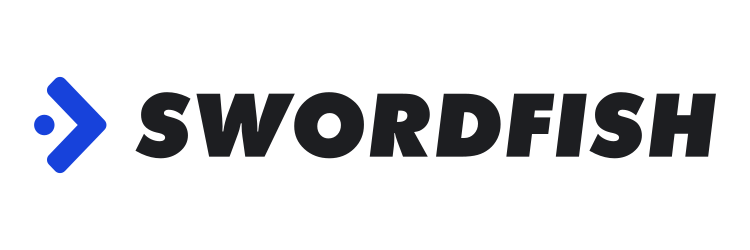
 View Products
View Products


